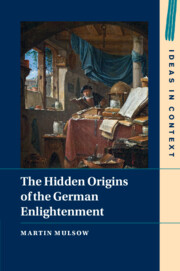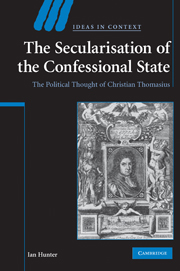The Hidden Origins of the German Enlightenment
The early German Enlightenment is seen as a reform movement that broke free from traditional ties without falling into anti-Christian and extremist positions, on the basis of secular natural law, an anti-metaphysical epistemology, and new social ethics. But how did the works which were radical and critical of religion during this period come about? And how do they relate to the dominant 'moderate' Enlightenment? Martin Mulsow offers fresh and surprising answers to these questions by reconstructing the emergence and dissemination of some of the radical writings created between 1680 and 1720. The Hidden Origins of the German Enlightenment explores the little-known freethinkers, persecuted authors, and secretly circulating manuscripts of the era, applying an interdisciplinary perspective to the German Enlightenment. By engaging with these cross-regional, clandestine texts, a dense and highly original picture emerges of the German early Enlightenment, with its strong links with the experience of the rest of Europe.
- Provides lucid analysis of what 'atheism' meant in the period
- Reconstructs actual instances of atheism through the use of case-studies
- Differentiates atheism from the doubt experienced by Christians
Product details
July 2023Adobe eBook Reader
9781009241120
0 pages
This ISBN is for an eBook version which is distributed on our behalf by a third party.
Table of Contents
- Introduction
- 1. The mortal soul: biblicism, materialism and the new science
- 2. Nature and idolatry. The ambivalence of the natural from Henry Stubbe to Christian Gabriel Fischer
- 3. The doctrine of the temperaments: medicine and the problem of atheism
- 4. Natural law, religion and moral scepticism
- 5. From Becmann to Stosch: the Socinian contexts of the concordia rationis et fidei [the harmony of reason and faith] (1692)
- 6. The founders of religion as human beings: Moses and Jesus between inflation and deflation
- Conclusion.







.jpg)